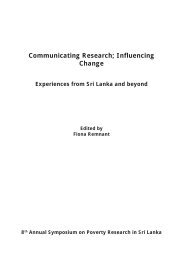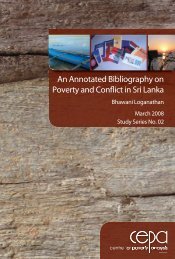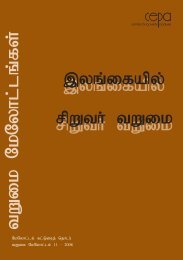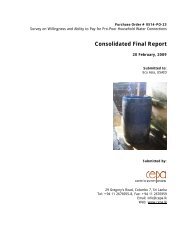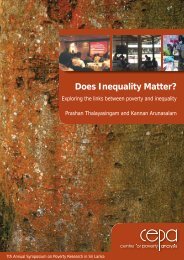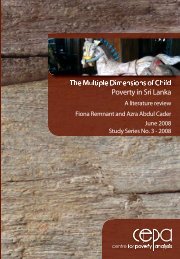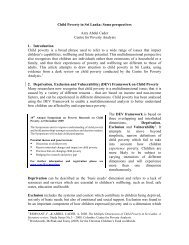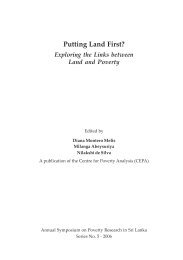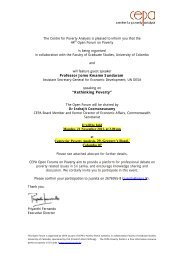Involuntary Displacement and Resettlement â Policy and ... - CEPA
Involuntary Displacement and Resettlement â Policy and ... - CEPA
Involuntary Displacement and Resettlement â Policy and ... - CEPA
- No tags were found...
You also want an ePaper? Increase the reach of your titles
YUMPU automatically turns print PDFs into web optimized ePapers that Google loves.
Exclusion <strong>and</strong> discrimination from other groups in society show howrural-urban fissures in the country emerge <strong>and</strong> articulate along the lines ofclass <strong>and</strong> location. Moratuwa on the margins of the modern capital isconnected to crime, uncouth loud speech, <strong>and</strong> the use of slang <strong>and</strong> otherfilthy language that residents of Saliyawewa perceive as not present in, <strong>and</strong>thus a threat to, their community. The Moratuwa residents or ‘people likethat’ would bring with them a culture that does not fit in Saliyawewa. Thesepractices of constructing the ‘other’ are not new, but have profoundimplications for displaced persons (see recommendations below).The practice <strong>and</strong> policy of tsunami compensation discussed above reproducethe structures <strong>and</strong> systems that keep the poor in positions of vulnerability<strong>and</strong> underscore the flawed logic that equates property rights withempowerment. Only when rights are recognised are potential claimantsempowered. A woman with property in the name of a dead man seemsbetter able to secure an entitlement than if it is in her own. Poor persons whowork in the informal sector cannot afford to travel to distant places to find anew place to live or are unable to underst<strong>and</strong> how to navigate the sea ofpaperwork <strong>and</strong> legal formalities to purchase a new piece of l<strong>and</strong> whilesimultaneously meeting compensation requirements. Rejecting thegovernment’s compensation package exposes the frustration of familieswho cannot live where they once lived <strong>and</strong> want to continue to live, butneed to rebuild tens or hundreds of kilometres away.Examining tsunami compensation highlights the disjuncture between law,policy <strong>and</strong> social reality. While cohabitation situations <strong>and</strong> joint familiesmight be socially recognised <strong>and</strong> acceptable by administrative officers suchas GNs or DSs, the legal framework does not support these realities. Thesubjective nature <strong>and</strong> the personal negotiation involved in securingrecognition from a representative of the state show how opportunities arecreated for an official to exploit his/her power <strong>and</strong> provides both an exampleof how access to tsunami compensation is an analytical ground for studyingcontemporary socio-political relations in Sri Lanka, <strong>and</strong> a lens to view howsocial exclusion is a political process inflected by gender, age, wealth orethnicity.Considering vulnerability as a social relationship <strong>and</strong> not as a category forcesan examination of how vulnerability is created <strong>and</strong> reproduced. Examiningthe social realities of individuals left behind in transitional shelter sitesprovides a point for reflection on how goods <strong>and</strong> services have been deliveredin the post-tsunami reconstruction process, <strong>and</strong> presents an opportunity200



